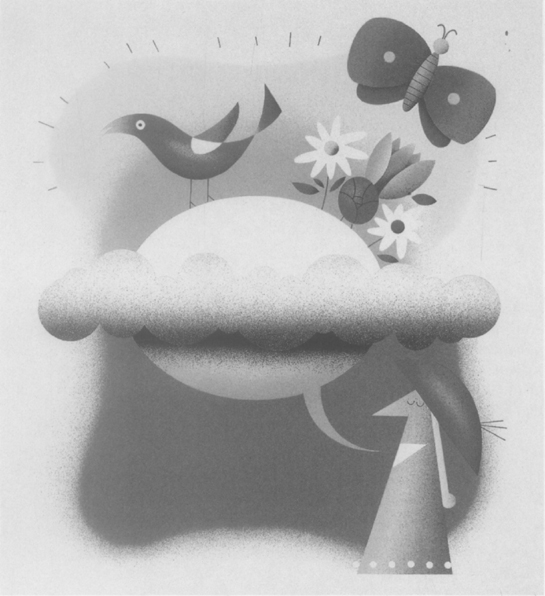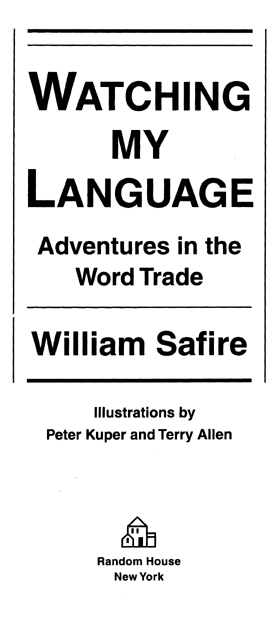ALSO BY WILLIAM SAFIRE
LANGUAGE
In Love with Norma Loquendi
Quoth the Maven
Coming to Terms
Fumblerules
Language Maven Strikes Again
You Could Look It Up
Take My Word for It
I Stand Corrected
Whats the Good Word?
On Language
Safires New Political Dictionary
POLITICS
The First Dissident
Safires Washington
Before the Fall
Plunging into Politics
The Relations Explosion
FICTION
Sleeper Spy
Freedom
Full Disclosure
ANTHOLOGIES
Lend Me Your Ears: Great Speeches in History
(WITH LEONARD SAFIR)
Good Advice on Writing
Leadership
Words of Wisdom
Good Advice
Copyright 1997 by The Cobbett Corporation
All rights reserved under International and Pan-American Copyright Conventions.
Published in the United States by Random House, Inc., New York, and simultaneously in Canada by Random House of Canada Limited, Toronto.
Illustrations by Peter Kuper and Terry Allen
Grateful acknowledgment is made to The New York Times for permission to reprint 76 On Language columns by William Safire from the May 5, 1991, through January 24, 1993, issues of The New York Times Magazine. Copyright 1991, 1992, 1993 by The New York Times Company. Reprinted by permission.
Library of Congress Cataloging-in-Publication Data
Safire, William.
Watching my language: Adventures in the Word Trade / by William Safire.
p. cm.
eISBN: 978-0-307-79976-0
1. English languageUsage. 2. English languageStyle.
I. Title.
PE1421.S2337 1996
428dc20 95-3800
Random House website address: http://www.randomhouse.com/
v3.1
For Mort Janklow,
from his first literary client
twenty-four books later
Contents
I do here, in the Name of all the Learned and polite Persons of the Nation, complain that our Language is extremely imperfect; that its daily Improvements are by no means in proportion to its daily Corruptions, that the Pretenders to polish and refine it have chiefly multiplied Abuses and Absurdities.
J ONATHAN S WIFT , Proposal for Correcting, 1712
INTRODUCTION
The early 1990s will be remembered not, as some economists say, as the Age of Affluence; nor as some environmentalists insist, the Age of Effluence; nor even, as Washington lobbyists insist, the Age of Influence. The linguists of tomorrow will call this the Age of Euphluence.
Dont run to your dictionary; I just made up that word to portray the power of the Prettification Patrol, and to deride its need to apply soft words to hard reality in the form of euphemism.
Prettification Patrol
Lets say youre trying to peddle some fake flowers. Do you call yourself a fake-flower peddler? Of course not; youre a floral marketer, artificial-flower division.
Now you look at your productsometimes quite beautiful, petals made of silk or whateverand you ask yourself, Why artificial? Thats a word that turns buyers off. You brood about that, and come up with a fresh-as-a-daisy answer: Youll create a market for permanent flowers. That not only lends longevity to your produce, but it also knocks the noxious weeds turned out in hothouses and pesticide-ridden, inorganic, fertilizer-driven gardens as temporary flowers.
Thats the art, or racket, of euphemism, from the Greek eu-, good, and pheme, speech. And its been gaining speed ever since environmentalists were able to transform the damn jungle into the glorious rain forest (where you can get wetlands fever).
Some objects of green wrath, lumbermen and fishermen, counterattacked with euphemisms of their own. The timber industry speaks of harvesting trees on public lands, the fishing industry of harvesting fish from the ocean, grumps Ray Sawhill of New York. My understanding is that in order to harvest you have to have first reaped. Maybe he means sown; at any rate, if you have planted the trees, or raised the fish from caviar, you could then harvest them, although harvest is not a term that goes well outside the vegetable world. Thus, I would not use the headline, as The New York Times recently did, Giant Maw for Fish Harvesting.

No newspaper can be held responsible, however, for the prose prettification in its advertising. If youre appealing to a snooty clientele, you hate to use the word sale; nice stores dont have sales. (In France, sale is a dirty word.) If its cheap but it hasnt been marked down yet, call it a special purchase. Or, if youre the Atrium Gallery on Fifth Avenue, Join us for our current anniversary exhibition of master jewelers and receive a 10 percent accommodation. Hotels provide accommodations; what will they now call a lowering of rates on rooms?
Even the most innocent words, when they take on a taint, are quickly euphemized. The Miss America contest, eager to shed any hint of royalism, now forbids the use of reign to denote the period in which here-she-comes holds the title; her once-reign is now a year of service.
No longer need Shakespeares Edmund, in King Lear, cry, Now, gods, stand up for bastards! As Ben J. Wattenberg has written of those born on the wrong side of the blanket: It was once called bastardy. Then illegitimacy. Then out-of-wedlock birth. And now, frequently, wholly sanitized, nonmarital birth. (He left out love child.)
Do you do euphemisms? writes Ben Bradlee, The Washington Posts vice president at-large. (In my view, the hyphen makes the words mean not confined to a specific assignment; without the hyphen, it would mean sought after by the police.) He cited a broadcast by Peter Jennings of ABC when Yasir Arafats plane was missing: if something has befallen him in a terminal way.
Because the word lying is off-putting to some, we have seen some prettification under oath. Oliver North denied lying to Congress, but admitted he had provided input which differed radically from the truth. And Roger Le Locataire notes from Ponders End, London, that British officials caught telling half-truths or otherwise deceiving the court admit they have been economical with the truth.
In the general derogation of politically correct terms, some euphemism has been parodied: Nobody seriously uses vertically challenged for short, or holds that a bad speller is orthographically impaired; Clyde Haberman of The New York Times was writing tongue-in-cheek when he described a rotund Turkish political figure as kilogramically endowed. But some writers have rejected prostitute for the less pejorative sexual worker, and the person in charge of waste disposal (formerly garbage) for the township of Montclair, New Jersey, refers to herself as senior sanitarian.
In politics, the Clinton Administration has made it linguistic policy to refer to the taxes necessitated by its health plan as premiums, which most people associate with insurance policies. Others say that if the payment is mandatory, its a tax









